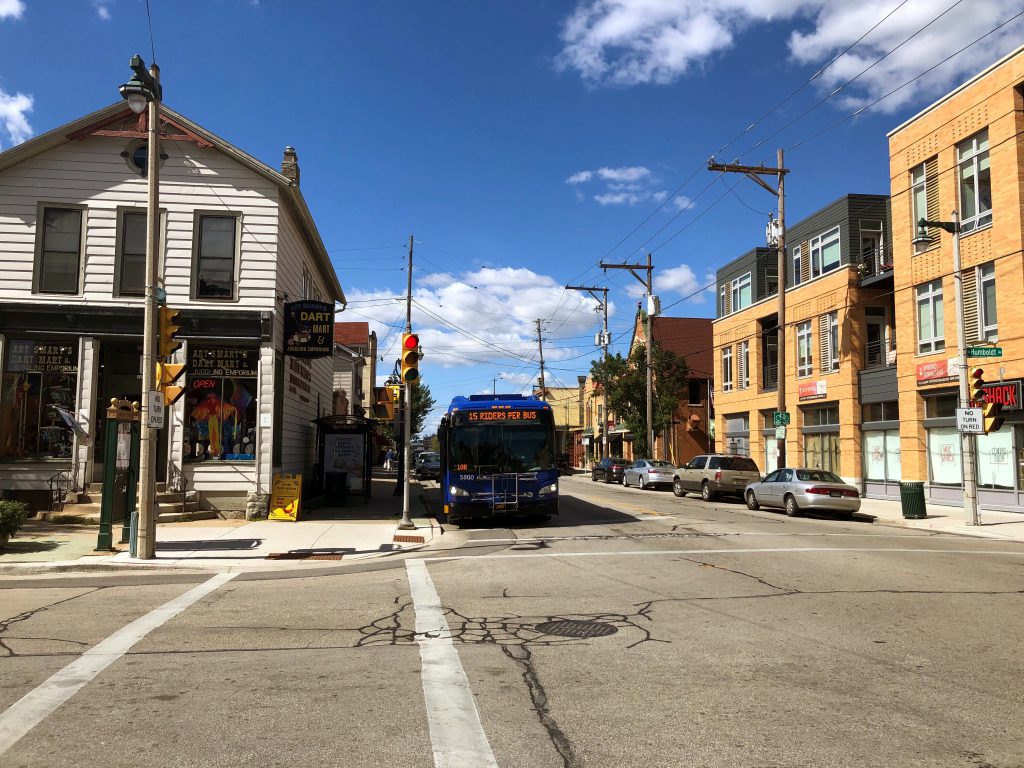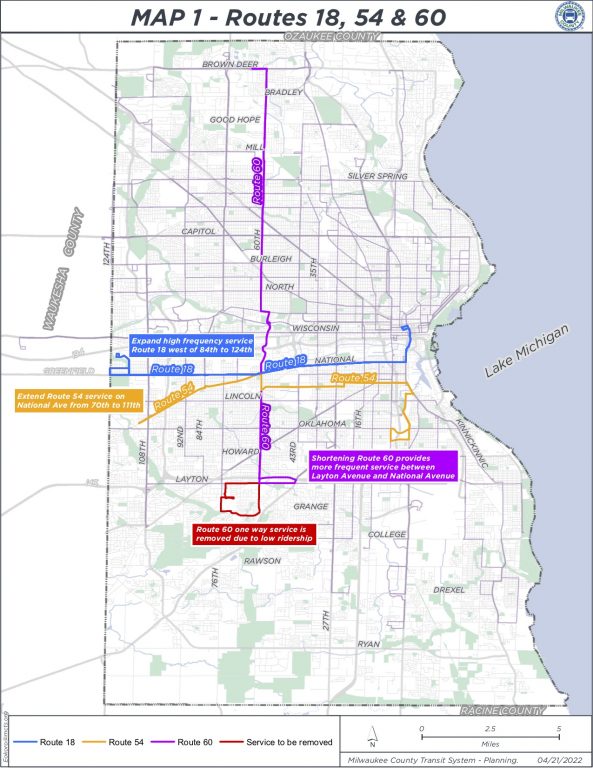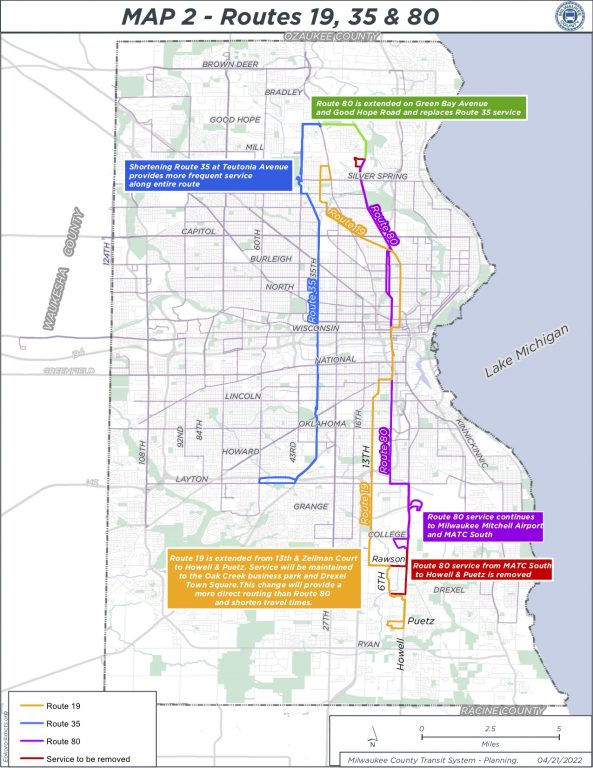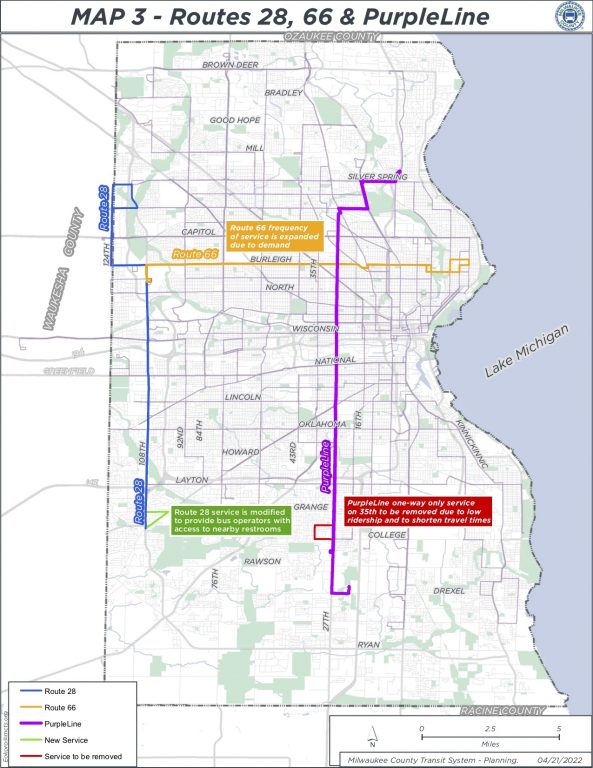MCTS Will Change 9 Bus Routes
Changes based on rider feedback to 2021 system redesign, to achieve still more frequency, and trim less-used routes.
Throughout 2021, the Milwaukee County Transit System (MCTS) was engaged in a system-wide redesign of bus service called MCTS NEXT, rebalancing bus routes so a majority were providing high-frequency service.
The transit system, which has struggled with inadequate revenue and service cuts for years, developed the overhaul to be cost neutral. This meant that some low-traffic bus service was cut to move resources to new high-frequency routes where riders have shorter waiting times at bus stops, quicker travel times, more reliable service and faster transfers to other routes.
Now, after implementing the new system in three phases last year, the transit system is planning to make some tweaks to the system beginning this fall. A report from MCTS stated the “marginal changes” are being made as part of “our ongoing desire to be responsive to rider’s specific comments after NEXT was implemented.”
Like the redesign itself, these modifications are planned to be cost neutral, and require repositioning some service and cutting others. They were presented to the county board’s Transportation, Public Works and Transit Committee Tuesday.
Jeff Sponcia, transportation program planning manager for the Milwaukee County Department of Transportation (MCDOT), which oversees the quasi-governmental MCTS, told the committee that the department endorses the changes, and said, “These changes now that are before you will bring more high frequency service.” He noted that increasing the frequency of bus service along a route can greatly decrease travel times for riders who have to make one or more transfers.
One of the major changes shown in this first map is high frequency service along Route 18, which largely runs along W. National Ave. and W. Greenfield Ave. between S. 1st St. and S. 124th St., will be extended to its western terminus at 124th St. Route 54 will be extended along W. National Avenue between S. 70th St. and S. 111th St., which is a change that was requested by a lot of West Allis riders on route 54, said Jesus Ochoa, planning manager MCTS, presenting the proposed changes to the committee.
Also, the one-way loop to Southridge Mall at the southern end of Route 60 will be eliminated due to low ridership, increasing frequency along the route.
The changes in this map will both improve frequency and extend high-frequency service along existing routes.
First, the high frequency service on Route 80 will be extended further north to W. Good Hope Rd. and N. Teutonia Ave. This will connect with Route 35 and replace service that route was providing along W. Good Hope Rd., and should in turn improve frequency along that route. It also creates a new connection to N. Green Bay Ave., Ochoa said.
On the southern end of the county, Route 19 is extended south connecting with Drexel Town Square in Oak Creek. “This change would be more frequent to Drexel Town Square,” Ochoa said. “It would be simpler and more direct.”
The southern end of Route 80 is being shortened, cutting service south of the MATC South campus.
The changes in this map are primarily about two things: increasing high frequency service and increasing restroom access for bus operators, Ochoa said.
High frequency service on Route 66, which primarily runs along W. Burleigh St. will become even more frequent due to a high demand along that corridor. The southern end of Route 28 is slightly modified to increase bathroom access for operators at turnarounds.
Also, a short segment of one-way service along S. 35th St. that branches off from the Purple Line will be eliminated. This will both shorten travel times along the route and adds more layover times for operators at the end of the route.
The committee unanimously approved the changes. They will next go before the full board for final approval.
MCTS NEXT Feedback
MCTS is holding three virtual community listening sessions over the next week on June 8, 9 and 13, to gather feedback on changes to the bus system implemented in 2021. This webpage includes links to register to participate in these meetings.
The transit system has already received some positive initial feedback on the changes. An annual rider survey distributed in December 2021, more than three months after the system finished implementing the redesign, showed that 75% of all riders reported MCTS met or exceeded their needs, and 70% felt the frequency met or exceeded their needs, according to a report by MCTS.
Donnell Shorter, president of the Amalgamated Transit Union Local 998, told the committee that there has been at least one “hiccup” in the rollout of MCTS NEXT. “I think the biggest issue we have is just the short run times,” he said. “What I mean by that, from Point A to Point B and picking up passengers and sometimes not having enough time to do that.”
Michael Brown, ATU vice president, agreed, saying that drivers are not providing the safest possible service when they are racing to make their route on time.
If you think stories like this are important, become a member of Urban Milwaukee and help support real, independent journalism. Plus you get some cool added benefits.
MKE County
-
Fellow Judge Testifies in Dugan Case
 Dec 16th, 2025 by Graham Kilmer
Dec 16th, 2025 by Graham Kilmer
-
Key Questions in Dugan Trial Take Shape on First Day
 Dec 15th, 2025 by Graham Kilmer
Dec 15th, 2025 by Graham Kilmer
-
FTA Tells Milwaukee to Crack Down on Fare Evasion — Even Where Fares Don’t Exist
 Dec 12th, 2025 by Graham Kilmer
Dec 12th, 2025 by Graham Kilmer
Transportation
-
Congestion Pricing Cuts Air Pollution in New York City
 Dec 14th, 2025 by Jeff Wood
Dec 14th, 2025 by Jeff Wood
-
FTA Tells Milwaukee to Crack Down on Fare Evasion — Even Where Fares Don’t Exist
 Dec 12th, 2025 by Graham Kilmer
Dec 12th, 2025 by Graham Kilmer
-
Will GOGO’s Bus Service Ever Get Going?
 Dec 9th, 2025 by Jeramey Jannene
Dec 9th, 2025 by Jeramey Jannene

























